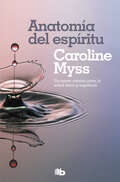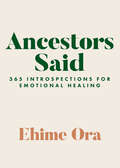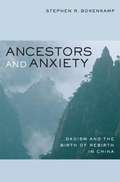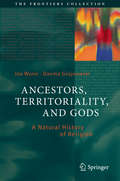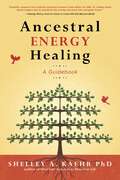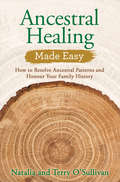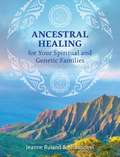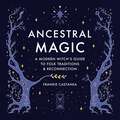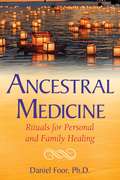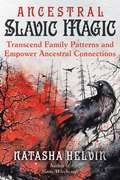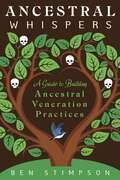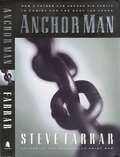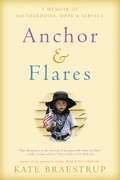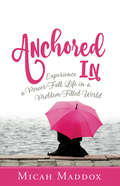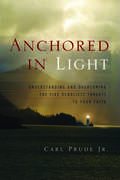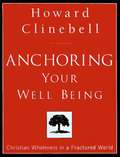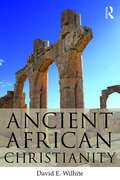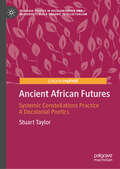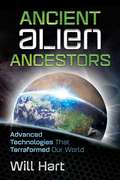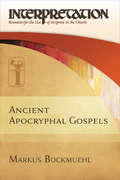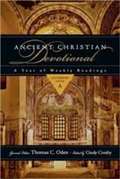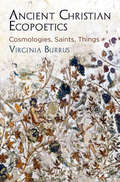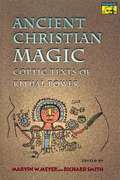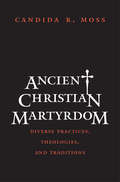- Table View
- List View
Anatomía del espíritu: La curación del cuerpo llega a través del alma
by Caroline MyssCombinando diversas creencias para discutir la salud y la anatomía, la autora de Las siete moradas trata en este libro los sacramentos cristianos, los chakras hindús y el árbol de la vida del Kábala para determinar las siete regiones de energía que posee el cuerpo humano. Tarde o temprano, todos los seres enfermamos y el dolor reduce nuestra capacidad para el trabajo el placer, llegando incluso a arrebatarnos la vida. Sin embargo, pocas son las personas conscientes de que la enfermedad aparece cuando malgastamos nuestra energía, permitimos que nos la roben o la encarrilamos hace objetivos erróneos. Comprenderlo así nos abre el camino de la autocuración, un milagro posible si interpretamos las dolencias del cuerpo como lo que de verdad son: expresiones de un malestar espiritual que tiene curación.
Anatomía del espíritu: La curación del cuerpo llega a través del alma
by Caroline MyssEl long seller que nos enseña que la curación del cuerpo llega a través del alma. El aclamado programa de sanación a través de los siete pilares del poder energético. Este mítico libro resume más de dos décadas de investigación de Caroline Myss, una de las mayores voces de la espiritualidad mundial, en el campo de la medicina energética. En él muestra cómo cada enfermedad responde a un patrón de estrés emocional y psicológico vinculado a distintas áreas del cuerpo humano. Pero también ofrece un revolucionario programa que sintetiza la antigua sabiduría de tres religiones (los sacramentos cristianos, los chakras hindúes y el árbol de la vida de la Cábala) para demostrar los siete puntos energéticos de nuestro cuerpo, sus correspondencias y el modo en que nos afectan sus disfunciones. Al descubrirlo, se abre el camino de la autocuración, un milagro que muestra cómo interpretar las dolencias físicas y desarrollar los poderes latentes de la intuición para cultivar el crecimiento espiritual.. Reseña:«Una de las mejores voces de la espiritualidad.»Publishers Weekly
Ancestors Said: 365 Introspections for Emotional Healing
by Ehime OraA joy-filled gift from the ancestors composed of 365 gentle prayers and affirmations to intuitively provide you with healing all year long.&“Ancestors said they experience life through your eyes. Living your life as full as you can nourishes them. You being alive is enough for them.&” &“I pray that you see life through. I pray that you let it show you just how good it can get.&” &“If you&’re feeling stuck, speak to the heavens. A path to freedom will open up.&”Ancestors Said is full of 365 affirmations, prayers, and reflections just like these. It is designed to be used all year long, helping the reader along a healing journey and leading them to experience a deep connection with the ancestors and joy in their daily life.
Ancestors and Anxiety: Daoism and the Birth of Rebirth in China
by Stephen R. BokenkampThis innovative work on Chinese concepts of the afterlife is the result of Stephen Bokenkamp's groundbreaking study of Chinese scripture and the incorporation of Indic concepts into the Chinese worldview. Here, he explores how Chinese authors, including Daoists and non-Buddhists, received and deployed ideas about rebirth from the third to the sixth centuries C.E.
Ancestors, Territoriality, and Gods: A Natural History of Religion (The Frontiers Collection)
by Ina Wunn Davina GrojnowskiThis books sets out to explain how and why religion came into being. Today this question is as fascinating as ever, especially since religion has moved to the centre of socio-political relationships. In contrast to the current, but incomplete approaches from disciplines such as cognitive science and psychology, the present authors adopt a new approach, equally manifest and constructive, that explains the origins of religion based strictly on behavioural biology. They employ accepted research results that remove all need for speculation. Decisive factors for the earliest demonstrations of religion are thus territorial behaviour and ranking, coping with existential fears, and conflict solution with the help of rituals. These in turn, in a process of cultural evolution, are shown to be the roots of the historical and contemporary religions.
Ancestral Energy Healing: A Guidebook
by Shelley A. KaehrHeal Inherited Family Trauma with All-New TechniquesExpanding upon Shelley A. Kaehr's award-winning international bestseller Heal Your Ancestors to Heal Your Life, this book features hands-on workings from her revolutionary Ancestral Healing and Genealogical Regression practice.In addition to examples from her case studies, Shelley presents nearly fifty exercises and nearly fifty journal prompts designed to help you connect with immediate family lineages and repair troubled relationships. Discover the profound healing potential of rituals, meditations, trance work, and other practices as you overcome challenging chapters in your genetic heritage.These exercises help you meet your spirit guides, embrace your soul gifts, and reimagine difficult ancestral events by creating a new experience and narrative. Shelley also teaches you how to send love and support to future generations and receive your ancestors’ wisdom so you can make better decisions in the present. Includes a foreword by Cyndi Dale, bestselling author of Energy Work for the Everyday to Elite Athlete
Ancestral Healing Made Easy: How to Resolve Ancestral Patterns and Honour Your Family History
by Natalia O'Sullivan Terry O'SullivanIdentify old family wounds, communicate with your ancestral guides, heal your lineage and achieve wellbeing for yourself and loved ones.To understand who we are, we must know where and who we come from. Discover powerful practices to honour and heal your family lineage.Ancestral healing is the process of revealing and releasing inherited wounds and traumas that have been passed down by our ancestors. Anyone researching their heritage will uncover both positive and negative issues that pass through the bloodlines from one generation to the next. Once we understand the effects our family has had on our wellbeing, we can find ways to heal their influences and celebrate their legacy.Renowned soul rescuers Natalia and Terry O'Sullivan have distilled an array of practices, rituals, exercises and meditations to help you: • explore what ancestral healing is and how it can aid you • recognize how unresolved ancestral wounds have impacted your life • learn how to use rituals and practical exercises to honour and communicate with your ancestors • balance your physical, emotional and psychological wellbeing through healing the family woundsThe journey of ancestral healing is one of evolution and restoration. Each step, ritual and prayer will take you closer to the life your ancestors have dreamed for you.
Ancestral Healing for Your Spiritual and Genetic Families
by Jeanne Ruland ShantideviA practical guide to shamanic ancestor work, inspired by Huna and supported by guided rituals and exercises • Explains how to heal traumatic experiences and old blockages that are stored in the memory of your lineage • Includes Hawaiian teachings about spiritual and genetic ancestors and reveals how to bond with your spirit family, your Aumakua • Shows how unlocking the support of your ancestors enables you to shine your light fully Knowing your ancestral lineage is not only a matter of curiosity, your life path will unfold with much more ease if you are aware and in harmony with your origins. Exploring the heritage of your bloodline as well as the energy of your spiritual family, which we are often less aware of, opens you up to enormous potential for healing and self-development. This practical guide explains, in a clear and straightforward way, how the energy field of our ancestors influences our personal lives and how we can draw from their strength as well as liberate ourselves from burdens that have been carried over generations. It helps us to lift the veil of forgetting and allow ourselves to fully shine our light, supported by the souls that came before us, by making peace with past hurts and traumas. Drawing on the Huna Hawaiian shamanic tradition as well as other shamanic and energetic practices, the authors show how to connect with our Aumakua, our ancestors and higher self, which includes our close relatives, ancestors stretching back thousands of years, and our spiritual ancestors or karmic family. The authors offer practices to reconcile with our parents and spiritual family, uncover suppressed matters and family secrets, clear and charge our personal energy field and our family energy field, and awaken the potential of our bloodline. They explain how to perform an ancestor healing circle, carry out an ancestor release ritual, and offer blessings for children and grandchildren as well as providing meditative journeys to meet our ancestors, our spiritual family, and our spiritual roots in other realms. They also provide short case studies to illustrate how the rituals and exercises have worked for other people. By enacting ancestral healing, we can recognize who we are, where we come from, and truly fulfill our destiny in this life.
Ancestral Magic: A Modern Witch’s Guide to Folk Traditions & Reconnection
by Frankie CastaneaConnect with the power of the past and embark on a timeless journey of self-discovery and community.Modern witch Frankie Castanea, the author of Spells for Change, shows you how to explore your ancestral practices and traditions in an authentic, socially conscious way. Through exploring reconnection with communities and cultures, uncovering oral traditions and working with plant and spirit allies, Frankie demonstrates how your own practice can be enhanced by understanding and respecting the history it comes from.In this inclusive guide, Frankie helps you to discover the abundant energy that flows from tapping into the magic of folklore and tradition, and to build a deeper relationship with your own craft, ultimately becoming a better ancestor to future generations.
Ancestral Medicine: Rituals for Personal and Family Healing
by Daniel FoorA practical guide to connecting with your ancestors for personal, family, and cultural healing• Provides exercises and rituals to help you initiate contact with your ancestors, find ancestral guides, and assist the dead who are not yet at peace• Explains how to safely engage in lineage repair work by connecting with your more ancient ancestors before relating with the recently deceased• Explores how your ancestors can help you transform intergenerational legacies of pain and abuse and reclaim the positive spirit of the familyEveryone has loving and wise ancestors they can learn to invoke for support and healing. Coming into relationship with your ancestors empowers you to transform negative family patterns into blessings and encourages good health, self-esteem, clarity of purpose, and better relationships with your living relatives. Offering a practical guide to understanding and navigating relationships with the spirits of those who have passed, Daniel Foor, PhD, details how to relate safely and effectively with your ancestors for personal, family, and cultural healing. He provides exercises and rituals, grounded in ancient wisdom traditions, to help you initiate contact with your ancestors, find supportive ancestral guides, cultivate forgiveness and gratitude, harmonize your bloodlines, and assist the dead who are not yet at peace. He explains how to safely engage in lineage repair work by connecting with your more ancient ancestors before relating with the recently deceased. He shows how, by working with spiritually vibrant ancestors, individuals and families can understand and transform intergenerational patterns of pain and abuse and reclaim the full blessings and gifts of their bloodlines. Ancestral repair work can also catalyze healing breakthroughs among living family members and help children and future generations to live free from ancestral burdens. The author provides detailed instructions for ways to honor the ancestors of a place, address dream visits from the dead, and work with ancestor shrines and altars. The author offers guidance on preparing for death, funeral rites, handling the body after death, and joining the ancestors. He also explains how ancestor work can help us to transform problems such as racism, sexism, homophobia, and religious persecution.By learning the fundamentals of ancestor reverence and ritual, you will discover how to draw on the wisdom of supportive ancestral guides, heal family troubles, maintain connections with beloved family after their death, and better understand the complex and interconnected relationship between the living and the dead.
Ancestral Slavic Magic: Transcend Family Patterns and Empower Ancestral Connections
by Natasha Helvin• Offers traditional rituals and spells to help you connect with your ancestors, see your family&’s ancestral patterns, and change your destiny• Examines the history of ancestor worship in the Slavic tradition and ancient Slavic burial and funeral customs, many of which are still practiced today in remote pockets of Russia• Explores the similarities between ancestral beliefs in Haitian Vodou and the Slavic traditionRaised in the Soviet Union, where she grew up steeped in ancient Slavic magical traditions, occultist and hereditary witch Natasha Helvin reveals not only how you are continually and powerfully influenced by your ancestors but also how you can open the door to your ancestral connections in order to know who you truly are and change the course of your destiny.Helvin examines ancestor worship in southeastern Europe and western Russia and the way it shaped their indigenous magical and spiritual practices. She explains how energy flows in a familial context and how strengths and dysfunctions are passed from one generation to the next for centuries. She shares time-honored rituals and spells to help you to recognize these ancestral patterns and influences, make changes in the harmful ones, and harness your familial strengths to direct your destiny.Looking at both Slavic Pagan and Eastern Orthodox traditions concerning the dead, the author also examines ancient Slavic burial and funeral customs. She reveals how these burial rites became incorporated into rural witchcraft practices, and she explains traditional Slavic ideas on death and the afterlife, the soul, the spiritual power of colors, and magical objects.As an initiate in Haitian Vodou, Helvin also looks at the many parallels between Vodou and the folk magic and ancestor worship of the Slavic tradition, showing that in both traditions forging a stronger connection to your ancestors can lead to increased power and understanding in life.
Ancestral Whispers: A Guide to Building Ancestral Veneration Practices
by Ben StimpsonAn Invaluable Resource for Connecting to Your AncestorsPresenting historical and cultural examples of ancestral veneration from around the world, Ben Stimpson shows you how to build a strong, healthy relationship with your ancestors. He teaches the concepts and considerations of this important practice, walks you through the ins and outs of ritual, and shares profound insight on building community. Ancestral Whispers provides exercises and journal prompts specially designed to help you develop an authentic, living practice. Stimpson reveals the various types of ancestors and discusses the physical elements of practice, including sacred space, objects of power, and offerings. He also encourages you to explore the elements of pilgrimage and reflect deeply on your own beliefs. With this book, you can create a legacy for current and future generations.
Anchor Man: How a Father Can Anchor His Family in Christ for the Next 100 Years
by Steve FarrarIf you thought your parenting responsibilities ended after eighteen years per child, you thought wrong. Instead, it's your privilege to lead your family-and influence succeeding generations-for a century...or more.Anchor Man presents the high calling of fatherhood, the traits of a Christian father, the adventures that await him as he interacts with his children, and the significance of his role as a good family man. Steve Farrar presents these roles and responsibilities in a way any man wanting to increase his understanding of his place in the family, and our society, can put into action every day.Anchor Man encourages, exhorts, and demonstrates with biblical concepts how to raise a godly family and how to anchor that family in Christ for the next one hundred years. Farrar's unique teaching style blends humor and practicality with the tools fathers need to become all that God intended them to be as the leaders of their families."When a man gets serious about following Christ with his whole heart," Farrar says, "God desires to not only pour out His blessing on that man, but on his children, and his children's children.
Anchor and Flares: A Memoir of Motherhood, Hope, and Service
by Kate BraestrupKate Braestrup's life was transformed by the loss of her husband; now Kate faces the possibility that she may lose her son.As a young mother Kate Braestrup discovered the fierce protectiveness that accompanies parenthood. In the intervening years--through mourning her husband and the joy of remarriage and a blended family-Kate has absorbed the rewards and complications of that spirit. But when her eldest son joins the Marines, Kate is at a crossroads: Can she reconcile her desire to protect her children with her family's legacy of service? Can parents balance the joy of a child's independence with the fear of letting go? As Kate examines the twinned emotions of faith and fear-inspired by the families she meets as a chaplain and by her son's journey towards purpose and familyhood-she learns that the threats we can't predict will rip us apart and knit us together.
Anchored In: Experience a Power-Full Life in a Problem-Filled World
by Micah MaddoxProblems can make you feel like God is far away, but they can also be the very things that bring you closer to him.Anchored In isn’t a book of Christian cliché’s or sweet stories to warm the heart but rather an authentic look at the hard parts of life. It challenges us to stop running from and clinging to the past, and to grasp tightly to the only unshakable Anchor that is able to sustain our souls through the storms of life. Micah shares personal stories, such as her father’s abandonment of her family, and couples them with biblical application to offer real-life glimpses of God at work. She offers inspiration to live a life full of God’s power rather than one that causes us to turn away and be paralyzed by problems. Living anchored in God’s presence is a beautiful gift that few truly experience simply because they do not understand the key to God’s power – surrender. Or if they know to surrender, they do not know how to let go of the problems that consume their lives. Through simple, tangible steps learn to surrender in every season of life.Hearing from God is not reserved for a chosen few, but rather promised to those who believe. If you are longing to experience God’s power in a deeper way, this is a journey for you."When heartbreaking seasons shake us to our core, we often grab for everything other than God. But Micah tenderly reminds us page after page that Jesus is the only true Anchor who will hold us, steady us, and bring us through to the other side of every storm."— Lysa TerKeurst, New York Times bestselling author and president of Proverbs 31 Ministries As a friend and guide, Micah Maddox will walk with you through life's hard times and show you how, through God's power, you can get to the other side with greater freedom, strength and victory.— Holley Gerth, Wall Street Journal bestselling author of You're Already Amazing There are times when life hurts deeply. Though the grief, struggles and pain, we need reassurance that we are not alone. Micah Maddox’s book Anchored In, renews our hope and reminds us that God’s power can carry us through the stormy seas of life. Through scripture, stories and personal applications, Micah lovingly offers hope, victory and strength for everyone’s journey.— Karol Ladd, author of Thrive, Don’t Simply Survive and Power of a Positive Woman Life is hard. Most of us have learned that truth firsthand, the hard way. Trials, broken dreams, and the unexpected storms of life can leave us stuck in the past or numb in the present. Anchored In is more than a pep talk or quick-fix formula—it is a way of life. It should be required reading by every believer, whether your storm is in the past, the present, or looming on the horizon. Regardless of the forecast, grab a copy and get anchored in!— Vicki Courtney, best-selling author of 5 Conversations You Must Have With Your Daughter, Move On, and Rest Assured Micah speaks about deep issues, pains, and struggles because she has been there. In the pages of Anchored In, you will find the healing hope of God. It’s brave, authentic, and powerful.— Courtney DeFeo, author of In This House, We Will Giggle When I watch the news each morning and feel the swirl of circumstances around me, it’s easy to feel powerless in this crazy world. Micah reminds us that it’s not our job to be powerful. It’s our gift to be connected to a powerful God. Through the vulnerable telling of her personal story and the timeless truths she embeds, Micah holds out a lifeline to us that’s Anchored In hope.— Amy Carroll, author of Breaking Up with Perfect and Proverbs 31 Ministries speaker and writer With tenderness and understanding garnered through personal experience, Micah Maddox points us to the healing power available to those who are anchored in relationship with Jesus Christ. Some shredded places in my heart have been mended.— Cindi Wood, speaker, author of Anonymous: Discovering The Somebody You Are to God One of the purposes of an anchor is to keep the ship from drifting or being dragged by the wind. A drifting ship could easily be damaged. A drifting Christian f
Anchored in Light: Understanding and Overcoming the Five Deadliest Threats to Your Faith
by Carl Prude JrThis book addresses five of the deadliest threats confronting the faith community today, and presents the keys to vibrant spiritual living in the face of unique twenty-first century challenges. The twenty-first century is a crowded convergence of cultures, ideas, and beliefs. The once clear "black and white" of faith seems to have fallen into a bucket of gray. What's really going on in today's faith community, and more importantly, how does it impact your life?In Anchored in Light, former pastor Carl Prude Jr. takes an honest look at the shifting trends in today's faith community and tackles some of the difficult questions about faith and society. You'll be surprised at some of the answers.The book addresses questions like: What are the five deadliest threats to your faith? What are the indispensible anchors for thriving in the twenty-first century? What is the Lost in Faith Experience, and what causes it? What is essential to moving forward with a vibrant, faith-centered life today?If you've struggled with making sense of faith in modern times and long for restored spiritual confidence, a clear sense of direction, and refreshed hope, this book is written just for you.
Anchoring Your Well Being: Christian Wholeness In A Fractured World
by Howard J. ClinebellAnchoring Your Well Being offers suggestions for leading a more healthy life in seven dimensions: spirituality, physique, mental health, relationships, work and play, environmental, and crises and loss. Biblical text provides guidance and a basis for holistic health.
Ancient African Christianity: An Introduction to a Unique Context and Tradition
by David E. WilhiteChristianity spread across North Africa early, and it remained there as a powerful force much longer than anticipated. While this African form of Christianity largely shared the Latin language and Roman culture of the wider empire, it also represented a unique tradition that was shaped by its context. Ancient African Christianity attempts to tell the story of Christianity in Africa from its inception to its eventual disappearance. Well-known writers such as Tertullian, Cyprian, and Augustine are studied in light of their African identity, and this tradition is explored in all its various expressions. This book is ideal for all students of African Christianity and also a key introduction for anyone wanting to know more about the history, religion, and philosophy of these early influential Christians whose impact has extended far beyond the African landscape.
Ancient African Futures: Systemic Constellations Practice a Decolonial Poetics (Palgrave Studies in Decolonisation and Grassroots Black Organic Intellectualism)
by Stuart TaylorAncient African Futures provides a creative and critical account of the history and form(s) of systemic constellations practice (SCP) applying a decolonial lens, emphasizing the profound significance of Zulu epistemology on its origins. The volume opens with an autoethnographic account of the author&’s African diasporan / European identity and its bearing within the SCP profession. It offers a summary introduction to SCP as a discrete modality of Western psychotherapy, commonly accepted as the creation of Anton Hellinger, a German national. Hellinger was a Jesuit missionary priest in South Africa during the 1950-1960s. The author argues that this colonial phenomenon and Hellinger himself, are emblematic of the European Imperial project. The volume scrutinises this historic-contemporary dynamic in relation to more-than-Western indigenous epistemologies, advocating for a pluriversal reckoning, considering European colonial histories and indigenous forms of cultural resistance. Having interrogated the asymmetric dynamic exchange between Africana and Western cultures, the volume then explores a &‘speculative manifesto&’. This manifesto proposes numerous concrete actions regarding future curriculum design and faculty representation within professional SCP trainings, championing a recalibration, decentring whiteness, making SCP a profession more open to and representative of diverse global communities. Honouring their historic, cultural, colonial, postcolonial and political experiences, alongside their contemporary narratives of migration, settlement and resistance to Western neocolonialism. Ultimately, advocating for an empathetic and celebratory, Black / Global Majority Heritage-inclusive SCP practice model.
Ancient Alien Ancestors: Advanced Technologies That Terraformed Our World
by Will HartExplores evidence for the theory of directed panspermia--that life on Earth and the landscape of Earth itself was engineered by extraterrestrials• Details how the Earth was terraformed through a sophisticated geo-engineering program, providing clear examples such as the precise mathematical longitude configurations of the Great Pyramid of Giza with the major rivers on Earth• Shows how our spectrum of blood types supports the theory of panspermia while directly contradicting the conventional “out of Africa” theory of evolution• Examines the strongest modern UFO accounts, including the Russian Roswell case, as well as the suppressed UFO sightings of NASA astronautsIn the early 1970s, Nobel Prize-winning DNA co-discoverer Sir Francis Crick and his colleague Leslie Orgel proposed that in the distant past, an extraterrestrial race sent a spacecraft loaded with microorganisms to seed the Earth with life. Now, more than 40 years later, the fields of space research and biotechnology have advanced to the point where they can back up Crick and Orgel’s claims about our ancient alien ancestors.Sharing scientific evidence of alien involvement with life on our planet and with the very landscape of Earth itself, Will Hart refines the theory of directed panspermia--that life was intentionally seeded on Earth by extraterrestrials--to reveal that the same ET agency also created humans and generated civilization. He shows how the Earth was terraformed through an engineering program so sophisticated and vast that it has escaped our attention so far--for example, the major rivers on Earth are precisely aligned through geo-engineering with the Great Pyramid of Giza.Revealing the Great Pyramid as an alien message in stone, the author explains how the Giza pyramids could not have been built by the ancient Egyptians and examines the extraterrestrial energy technologies used to move the pyramids’ massive stone blocks, methods later rediscovered by Nikola Tesla and the builder of Coral Castle, Edward Leedskalnin. He details how an advanced race implanted the basic genome on Earth as well as genetically engineered the human race and shows how our spectrum of blood types supports the theory of panspermia while directly contradicting the conventional “out of Africa” theory of evolution.Investigating how the extraterrestrial agency behind the origin of civilization is still working behind the scenes today, the author examines the strongest modern UFO accounts, including the Russian Roswell case and the suppressed UFO sightings of NASA astronauts. He shows that this advanced ET civilization is not an alien race in the way we normally think of “aliens”--they are our ancestors and as human as we are.
Ancient Apocryphal Gospels
by Markus BockmuehlIn this reader-friendly guide, Markus Bockmuehl offers a sympathetic account of the ancient apocryphal Gospel writings, showing their place within the reception history and formation of what was to become the canonical fourfold Gospel. Bockmuehl begins by helping readers understand the early history behind these noncanonical Gospels before going on to examine dozens of specific apocryphal texts. He explores the complex oral and intertextual relationships between the noncanonical and canonical Gospels, maintaining that it is legitimate and instructive to read the apocryphal writings as an engagement with the person of Jesus that both presupposes and supplements the canonical narrative outline. Appropriate for pastors and nonspecialists, this work offers a fuller understanding of these writings and their significance for biblical interpretation in the church.
Ancient Christian Devotional: A Year of Weekly Readings
by Thomas C. Oden Cindy CrosbyThis guide to prayer and reflection combines excerpts from the writings of the church fathers as found in the Ancient Christian Commentary on Scripture with a simple structure for daily or weekly reading and prayer. There are fifty-two weeks of readings following the weekly lectionary cycle A. You can read through them in order or by thematic interest. Each day you will also find a simple opening and closing prayer drawn from the prayers and hymns of the ancient church. Come and find the deep nourishment God offers through the insights of this "cloud of witnesses"--the ancient church fathers.
Ancient Christian Ecopoetics: Cosmologies, Saints, Things (Divinations: Rereading Late Ancient Religion)
by Virginia BurrusIn our age of ecological crisis, what insights—if any—can we expect to find by looking to our past? Perhaps, suggests Virginia Burrus, early Christianity might yield usable insights. Turning aside from the familiar specter of Christianity's human-centered theology of dominion, Burrus directs our attention to aspects of ancient Christian thought and practice that remain strange and alien. Drawn to excess and transgression, in search of transformation, early Christians creatively reimagined the universe and the human, cultivating relationships with a wide range of other beings—animal, vegetable, and mineral; angelic and demonic; divine and earthly; large and small.In Ancient Christian Ecopoetics, Burrus facilitates a provocative encounter between early Christian theology and contemporary ecological thought. In the first section, she explores how the mysterious figure of khora, drawn from Plato's Timaeus, haunts Christian and Jewish accounts of a creation envisioned as varyingly monstrous, unstable, and unknowable. In the second section, she explores how hagiographical literature queers notions of nature and places the very category of the human into question, in part by foregrounding the saint's animality, in part by writing the saint into the landscape. The third section considers material objects, as small as portable relics and icons, as large as church and monastery complexes. Ancient Christians considered all of these animate beings, simultaneously powerful and vulnerable, protective and in need of protection, lovable and loving. Viewed through the shifting lenses of an ancient ecopoetics, Burrus demonstrates how humans both loomed large and shrank to invisibility, absorbed in the rapture of a strange and animate ecology.
Ancient Christian Magic: Coptic Texts of Ritual Power
by Richard Smith Marvin Meyer Neal KelseyThe main purpose of this volume is to present in English translation a representative selection of 135 Coptic texts of ritual power.
Ancient Christian Martyrdom
by Candida R MossThe importance of martyrdom for the spread of Christianity in the first centuries of the Common Era is a question of enduring interest. In this innovative new study, Candida Moss offers a radically new history of martyrdom in the first and second centuries that challenges traditional understandings of the spread of Christianity and rethinks the nature of Christian martyrdom itself. Martyrdom, Moss shows, was not a single idea, theology, or practice: there were diverse perspectives and understandings of what it meant to die for Christ. Beginning with an overview of ancient Greek, Roman, and Jewish ideas about death, Moss demonstrates that there were many cultural contexts within which early Christian views of martyrdom were very much at home. She then shows how distinctive and diverging theologies of martyrdom emerged in different ancient congregations. In the process she reexamines the authenticity of early Christian stories about martyrs and calls into question the dominant scholarly narrative about the spread of martyrdom in the ancient world.
